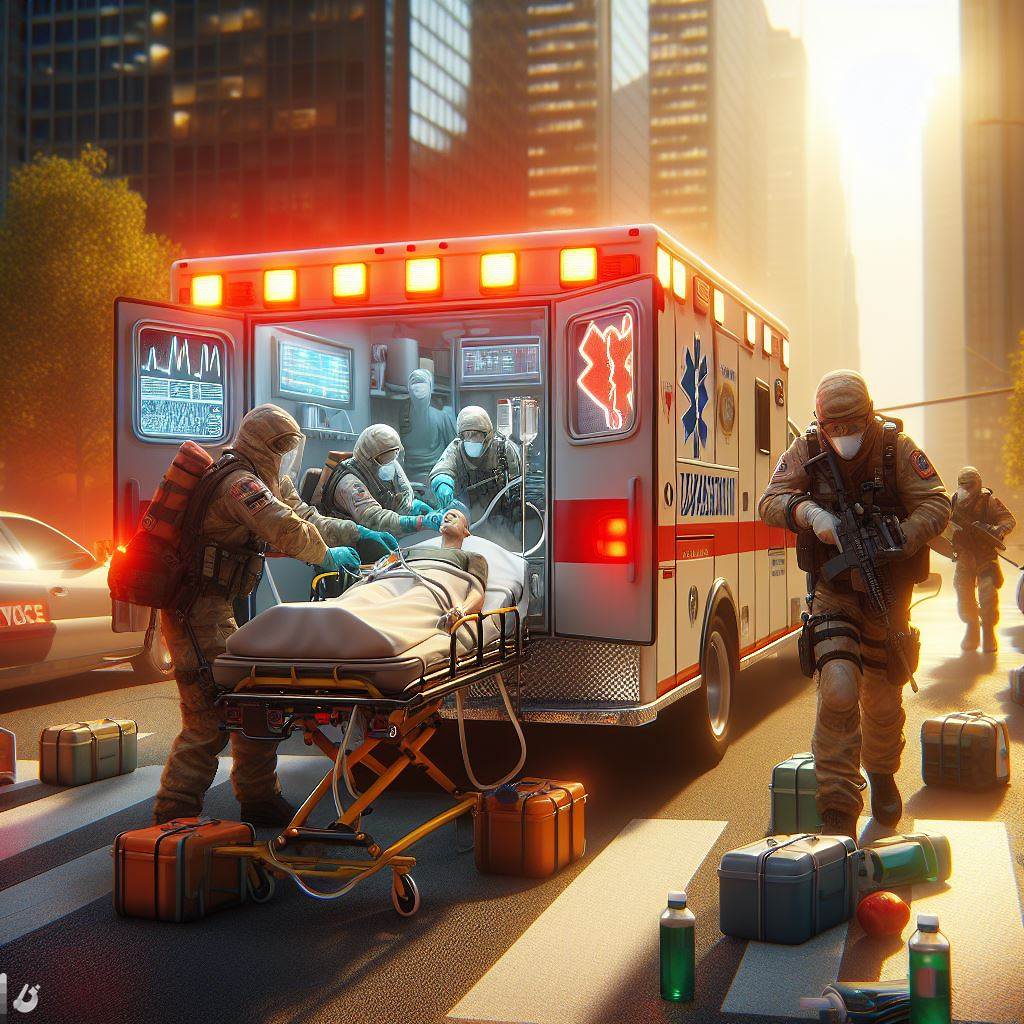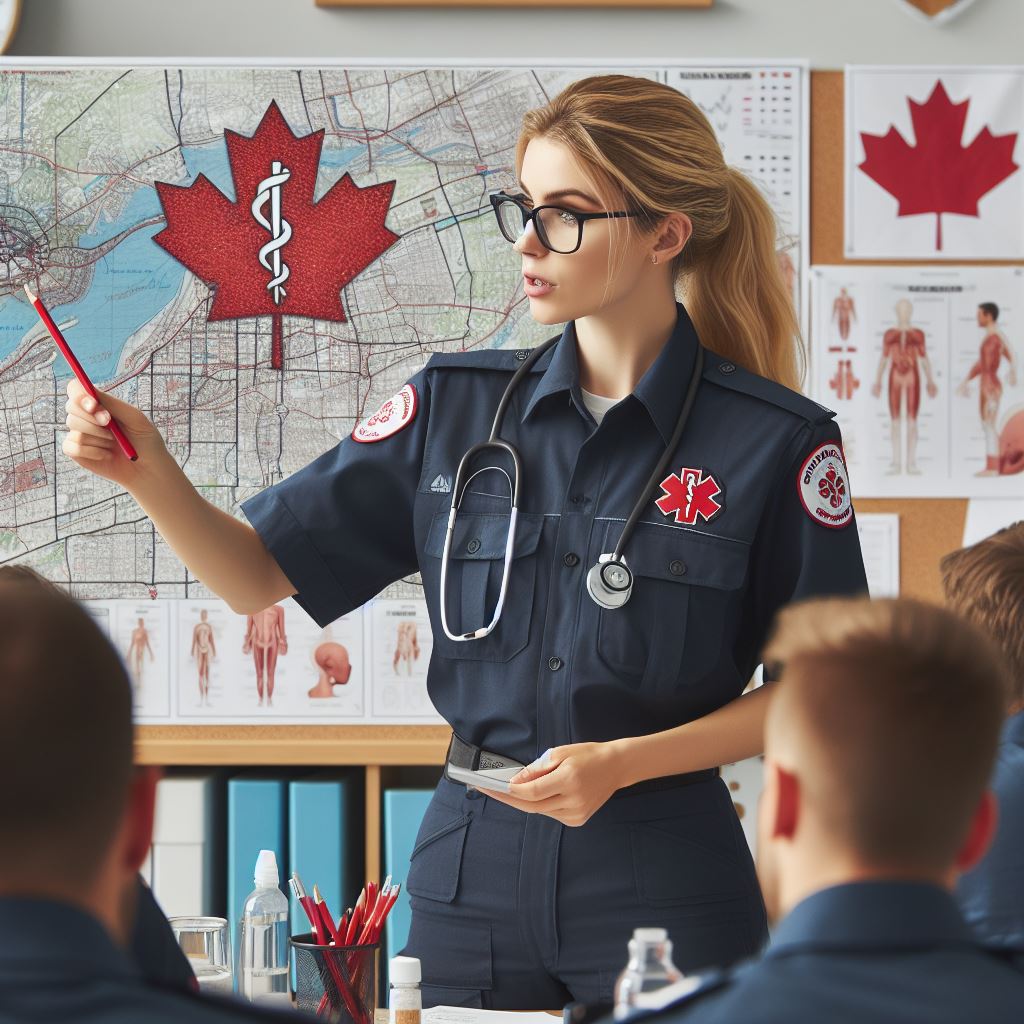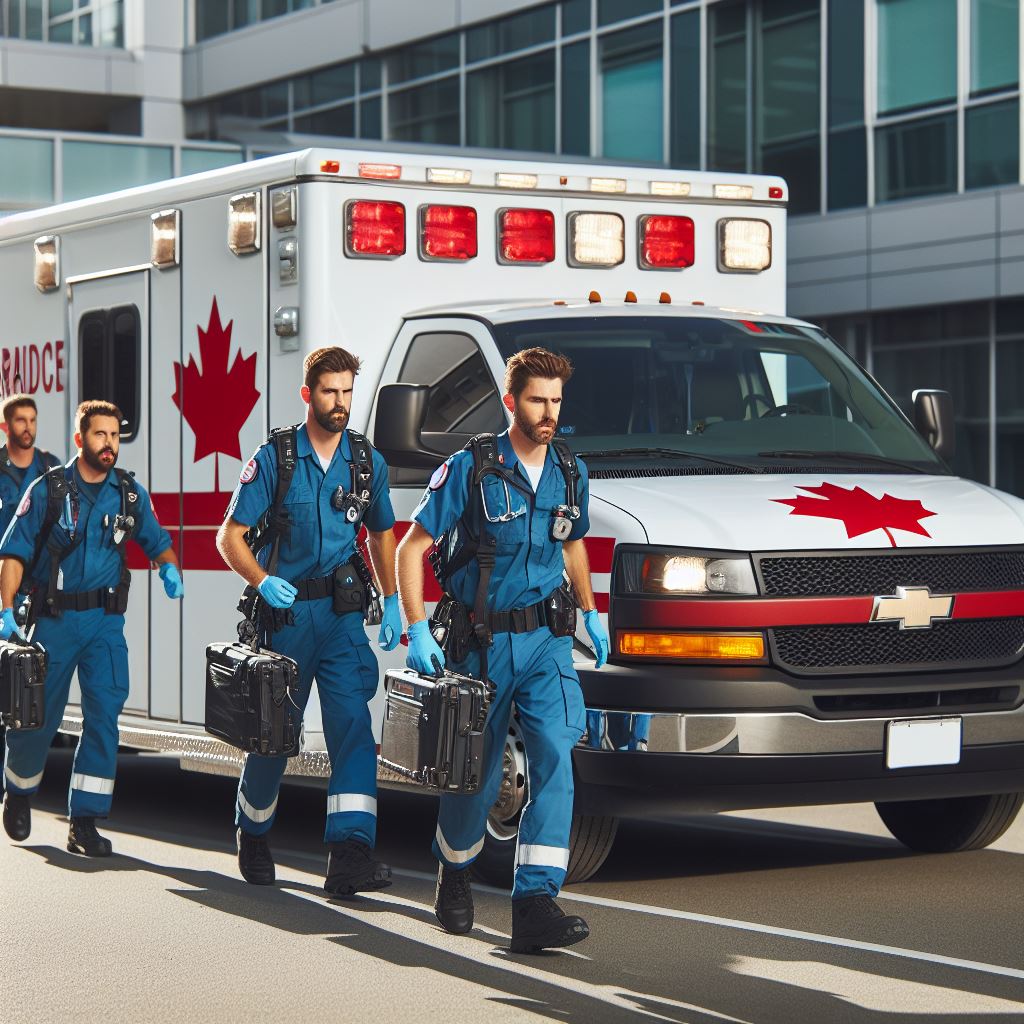Introduction
Background on paramedics and their role in emergency healthcare
Paramedics are highly trained medical professionals who provide critical care and treatment to patients during emergencies.
Brief overview of public health emergencies
Public health emergencies refer to situations that pose a threat to the health and safety of a community or population.
These emergencies can be caused by natural disasters, disease outbreaks, or biological and chemical hazards.
During these crises, paramedics play a crucial role in providing immediate medical assistance and saving lives.
Importance of paramedics in public health emergencies
Paramedics are often the first responders on the scene of a public health emergency.
Their quick response and ability to make critical decisions can significantly impact the outcome of these emergencies.
Paramedics are responsible for assessing and stabilizing patients, providing essential medical interventions, and coordinating with other healthcare professionals.
They also play a vital role in educating the public about preventive measures and helping to prevent further spread of diseases.
Challenges faced by paramedics in public health emergencies.
Paramedics face numerous challenges during public health emergencies, including limited resources, high workload, and exposure to dangerous situations.
They must maintain their own safety while providing care to those in need, and they often work under immense pressure and stress.
Most importantly, paramedics play a crucial role in public health emergencies by providing immediate medical care and saving lives.
Their expertise and dedication help mitigate the impact of these emergencies on individuals and communities.
We should recognize the invaluable contributions of paramedics and support their efforts in safeguarding public health.
Definition and overview of public health emergencies
Explanation of what constitutes a public health emergency
A public health emergency refers to a situation that poses a significant risk to the community’s health and requires urgent public health actions to prevent or minimize the impact.
These emergencies are often unexpected and can affect a large population or specific groups within a community.
Types of public health emergencies (natural disasters, epidemics, terrorist attacks)
1. Natural disasters
Public health emergencies can result from natural disasters such as hurricanes, earthquakes, floods, or wildfires.
These events can disrupt essential services, damage infrastructure, and cause injuries or fatalities.
Paramedics play a critical role in providing immediate medical assistance and rescue operations during such emergencies.
2. Epidemics
An epidemic occurs when there is a sudden increase in the number of cases of a particular disease above what is normally expected within a population.
Examples include outbreaks of infectious diseases like Ebola, Zika virus, or COVID-19.
Paramedics are at the forefront of responding to these emergencies, providing medical care, conducting contact tracing, and offering support in quarantine or isolation areas.
3. Terrorist attacks
Public health emergencies can also result from intentional acts of violence, such as terrorist attacks involving biological, chemical, or radiological agents.
These attacks may cause mass casualties and require a coordinated response from various emergency response teams, including paramedics.
Paramedics provide immediate medical care to those injured, transport patients to appropriate facilities, and assist in the management of hazardous materials.
Examples of notable public health emergencies
1. Hurricane Katrina
In 2005, Hurricane Katrina struck the Gulf Coast of the United States, causing widespread destruction and displacing thousands of individuals.
Unlock Your Career Potential
Visualize a clear path to success with our tailored Career Consulting service. Personalized insights in just 1-3 days.
Get StartedParamedics were vital in providing medical care, evacuating injured individuals, and setting up temporary medical facilities to meet the immediate healthcare needs of the affected population.
2. Ebola outbreak in West Africa
From 2014 to 2016, an Ebola epidemic ravaged several countries in West Africa, resulting in thousands of deaths.
Paramedics played a crucial role in identifying potential cases, providing isolation and transportation for infected individuals, and training healthcare workers on infection prevention and control measures.
3. COVID-19 pandemic
The ongoing COVID-19 pandemic, caused by the novel coronavirus, has been declared a global public health emergency.
Paramedics have been instrumental in responding to this crisis, conducting COVID-19 testing, providing pre-hospital care to severely ill patients, and administering vaccines as part of the vaccination campaigns.
All in all, public health emergencies encompass a range of situations that pose a significant risk to the health of communities.
Paramedics take on a pivotal role in responding to these emergencies, providing immediate medical care, evacuating individuals, and supporting other healthcare professionals in managing the aftermath.
Their presence and expertise are essential in safeguarding public health during trying times.
The role of paramedics in public health emergencies
Rapid response and emergency medical care
- Paramedics play a crucial role in public health emergencies by providing rapid response.
- They are trained to quickly assess and provide emergency medical care to individuals in need.
- Their prompt arrival at the scene can make a significant difference in saving lives.
- Paramedics are equipped with the necessary tools and knowledge to stabilize patients and address life-threatening conditions.
- They administer medications, perform CPR, and provide advanced life support interventions as required.
- By delivering immediate medical care, paramedics help increase the chances of survival and reduce the severity of injuries.
Importance of early assessment and triage
- Early assessment is a vital step in managing public health emergencies, and paramedics excel in this aspect.
- They are trained to quickly evaluate the condition of patients and determine the level of care needed.
- Paramedics prioritize patients based on the severity of their injuries or illnesses through a process called triage.
- Triage allows them to efficiently allocate resources and ensure that critical cases receive immediate attention.
- The ability to assess and triage patients in public health emergencies helps save valuable time and resources.
Collaborative efforts with other emergency response teams
- Paramedics work closely with other emergency response teams to ensure a coordinated approach during public health emergencies.
- They collaborate with firefighters, police, and other healthcare professionals to effectively manage the situation.
- Paramedics communicate patient information to hospital staff, enabling hospitals to prepare for incoming patients.
- Cooperation between different teams enhances the overall response and improves patient outcomes.
- Paramedics also support public health agencies by sharing critical data and observations from the scene.
- These collaborative efforts contribute to a comprehensive approach in handling public health emergencies.
In short, paramedics play a crucial role in public health emergencies. Their rapid response and emergency medical care are vital in saving lives.
Early assessment and triage help allocate resources efficiently, while collaborative efforts with other emergency response teams enhance the overall response.
Paramedics are frontline heroes who ensure the safety and well-being of individuals during critical situations.

Key responsibilities of paramedics in public health emergencies
During public health emergencies, paramedics play a vital role in providing immediate medical assistance and stabilizing patients.
Their key responsibilities include:
Providing immediate medical assistance and stabilizing patients
Paramedics are the first-line responders who provide essential medical care to individuals during public health emergencies.
They are trained to assess patients’ conditions, administer life-saving procedures, and manage critical situations.
With their prompt response and efficient decision-making, they can significantly impact the outcome of emergency situations.
Their primary objective is to stabilize patients by administering appropriate medical interventions.
This may include administering medications, performing emergency procedures such as CPR, managing trauma cases, and ensuring proper oxygenation.
Through their expertise, paramedics ensure that patients receive the necessary care to increase their chances of survival.
Implementing infection control measures
In public health emergencies, the risk of infection transmission is high. Paramedics play a crucial role in implementing infection control measures to prevent the spread of contagious diseases.
They adhere to strict protocols, such as wearing personal protective equipment (PPE) and following stringent hand hygiene practices.
Paramedics are trained to identify potential infectious diseases and take appropriate precautions to safeguard themselves and others.
By implementing infection control measures, they reduce the risk of spreading infections, protecting both patients and healthcare providers.
Assisting in the evacuation and transportation of patients
During public health emergencies, there may be a need to evacuate and transport patients to appropriate healthcare facilities.
Paramedics assist in this process by safely and efficiently transferring patients from the scene to healthcare facilities, taking into account their medical conditions.
They coordinate with other emergency personnel, ensure proper handling of patients, and provide continuous medical support during transportation.
Paramedics prioritize patients based on the severity of their condition, ensuring that those requiring immediate care receive timely treatment.
Collaborating with public health agencies and organizations
Paramedics work closely with public health agencies and organizations during public health emergencies.
They collaborate in planning and implementing emergency response strategies, providing valuable input based on their expertise.
This collaboration ensures a coordinated and effective response to the emergency.
Paramedics also share important patient information and observations with public health agencies, contributing to the overall situational awareness.
Their close partnership with these agencies enables seamless communication and resource allocation to address emerging needs.
In fact, paramedics play a critical role in public health emergencies by providing immediate medical assistance, implementing infection control measures, assisting in patient evacuation and transportation, and collaborating with public health agencies and organizations.
Their expertise and dedication are essential in saving lives and minimizing the impact of these emergencies on individuals and communities.
Read: Top Canadian Universities for Pharmacy
Challenges faced by paramedics in public health emergencies
Paramedics play a crucial role in responding to public health emergencies, but they face numerous challenges that can hinder their ability to provide effective care.
In this chapter, we will explore some of the key challenges faced by paramedics in these situations.
Limited resources and equipment during large-scale emergencies
During large-scale public health emergencies, such as natural disasters or pandemics, paramedics often find themselves facing a scarcity of essential resources and equipment.
This shortage can severely impact their ability to provide necessary treatment and care to those in need.
Without adequate supplies, paramedics may struggle to stabilize patients, administer life-saving medications, or even perform basic interventions.
Furthermore, limited resources can also lead to ethical dilemmas, as paramedics may have to make difficult decisions about who receives treatment and who does not. This can place a significant emotional burden on paramedics, who may feel torn between their duty to save lives and the reality of resource scarcity.
Emotional and psychological toll on paramedics
Public health emergencies can take a considerable toll on the mental well-being of paramedics. Responding to high-stress situations, witnessing traumatic events, and caring for critically ill patients can all contribute to the development of psychological and emotional distress.
Paramedics may experience symptoms of anxiety, depression, post-traumatic stress disorder (PTSD), and burnout.
The constant exposure to human suffering and the pressure to make quick decisions under challenging circumstances can lead to a decline in mental health and overall well-being.
It is essential for organizations and healthcare systems to prioritize the mental health of paramedics by providing access to counseling services, peer support networks, and other resources aimed at mitigating the psychological impact of their work.
Failure to address these emotional challenges can lead to reduced job satisfaction, increased turnover rates, and ultimately, a shortage of experienced paramedics in the field.
Potential exposure to hazardous substances or infectious diseases
Another significant challenge faced by paramedics in public health emergencies is the potential exposure to hazardous substances or infectious diseases.
Paramedics often work in environments where they come into contact with various chemical agents, toxins, and infectious pathogens.
For example, during a pandemic or outbreak, paramedics may be at risk of contracting highly contagious diseases like COVID-19.
This risk not only endangers their own health and well-being but also poses a threat to their families and communities.
To mitigate this risk, paramedics must adhere to strict infection control protocols, including wearing personal protective equipment (PPE) and practicing proper hand hygiene.
However, the availability of PPE can be limited during emergencies, further exacerbating the risk of exposure.
Additionally, the fear of transmitting infectious diseases to loved ones or vulnerable populations can cause additional stress and anxiety among paramedics, further adding to the numerous challenges they face.
In general, paramedics face several significant challenges when responding to public health emergencies.
Limited resources and equipment, the emotional and psychological toll, and potential exposure to hazardous substances are just a few of the obstacles they encounter.
It is crucial for organizations to recognize and address these challenges to ensure the well-being of paramedics and their ability to provide quality care in these critical situations.
Read: Balancing Work and Life as a Canadian Doctor
Training and Preparedness for Paramedics in Public Health Emergencies
A well-trained and prepared paramedic is crucial in responding effectively to public health emergencies.
These professionals play a vital role in saving lives and ensuring the well-being of individuals during critical situations.
To ensure their readiness, paramedics undergo various training programs and acquire certifications.
Mandatory Education and Certifications
Paramedics must complete a comprehensive education program accredited by the appropriate authorities.
This program equips them with the knowledge and skills necessary to respond to emergencies in public health situations.
It covers essential medical subjects, including respiratory and cardiac care, trauma management, and disaster medicine.
Additionally, paramedics need to obtain certifications to validate their competency. These certifications are often obtained through examinations that assess their knowledge, practical skills, and ability to handle emergencies.
Examples of certifications include Basic Life Support (BLS), Advanced Cardiac Life Support (ACLS), Pediatric Advanced Life Support (PALS), and Prehospital Trauma Life Support (PHTLS).
By requiring paramedics to complete education programs and obtain certifications, authorities ensure that these professionals are adequately trained to handle public health emergencies.
This way, they can make informed decisions and provide appropriate care to those in need.
Simulation Exercises and Drills for Emergency Response
Simulation exercises and drills play a crucial role in preparing paramedics for public health emergencies.
These activities replicate real-life scenarios, allowing paramedics to practice their skills and assess their performance in a controlled environment.
During simulation exercises, paramedics encounter different emergency scenarios, such as infectious disease outbreaks, mass casualty incidents, or chemical spills.
They are required to apply their knowledge and skills to manage these situations effectively. This hands-on experience helps them develop critical thinking, adaptability, and teamwork skills, which are essential for effective emergency response.
Furthermore, debriefing sessions that follow simulation exercises allow paramedics to reflect on their performance, identify areas for improvement, and learn from their experiences.
These sessions encourage self-assessment and promote continuous learning and professional growth among paramedics.
Continuous Professional Development and Staying Updated on Protocols
Paramedics’ training and preparedness for public health emergencies should not stop after their initial education and certifications.
Medical knowledge and emergency protocols evolve over time, requiring paramedics to engage in continuous professional development to stay updated.
Professional development opportunities, such as conferences, workshops, and online courses, enable paramedics to enhance their knowledge and skills.
These platforms facilitate knowledge sharing, expose paramedics to emerging trends and technologies, and provide updates on best practices in emergency response.
Furthermore, staying informed about changes in protocols and guidelines is essential for paramedics.
As public health emergency protocols may be revised based on new research or emerging diseases, paramedics must stay updated to ensure their responses align with the latest evidence-based practices.
Continuously updating their knowledge and skills through professional development and staying informed about protocols ensures that paramedics remain competent and prepared to handle public health emergencies effectively.
Generally, the training and preparedness of paramedics in public health emergencies are critical factors in ensuring their ability to respond effectively and save lives.
Mandatory education and certifications, simulation exercises, continuous professional development, and staying updated on protocols are essential components of their comprehensive training.
By investing in their training and preparedness, authorities can enhance the overall response to public health emergencies and minimize the impact on communities.
Read: The Future of Medicine in Canada: Trends & Predictions
Discover More: Healthcare Admins: Legislation Updates
Success stories and lessons learned from paramedics in public health emergencies
Notable cases where paramedics played a crucial role in saving lives
- In the aftermath of a natural disaster, paramedics were able to rapidly assess and treat injured individuals, preventing further complications.
- A paramedic team responded to a mass shooting incident, providing immediate medical care, and preventing fatalities.
- Paramedics successfully administered life-saving interventions to individuals experiencing cardiac arrests, significantly improving survival rates.
- During a pandemic, paramedics played a vital role in testing and triaging individuals, effectively containing the spread of the virus.
- In a terrorist attack, paramedics swiftly provided emergency care, treating victims and ensuring their safe transport to hospitals.
Best practices and strategies identified from past experiences
- Establishing efficient communication systems with hospitals and other emergency response agencies to ensure seamless coordination.
- Regular training for paramedics in handling public health emergencies, including simulation exercises and scenario-based drills.
- Implementing standardized protocols and guidelines for paramedics to follow, based on evidence-based practices and real-time data.
- Utilizing mobile medical units in densely populated areas to enhance response capabilities and provide immediate medical assistance.
- Collaborating with other public health agencies to integrate paramedics into a broader emergency response network.
Importance of ongoing evaluation and improvement in emergency response systems
Paramedics understanding the value of ongoing evaluation and improvement in emergency response systems is crucial to ensuring effective and efficient care in public health emergencies.
Lessons learned from past experiences can guide future response efforts:
- Evaluating response times and identifying potential bottlenecks to enhance speed and efficiency of care delivery.
- Reviewing patient outcomes to identify areas for improvement and optimize treatment strategies.
- Strengthening interagency collaboration through continuous communication and joint training exercises.
- Analyzing epidemiological data and trends to inform preparedness efforts and resource allocation.
- Adapting protocols and procedures based on emerging research, technological advancements, and lessons learned from other regions or countries.
By prioritizing ongoing evaluation and improvement in emergency response systems, paramedics can continuously enhance their ability to save lives and protect public health.
Read: Canadian Pharmacist Licensing Process
Conclusion
Recap of the paramedics’ role in public health emergencies
Paramedics play a crucial role in responding to public health emergencies, providing immediate medical care and triaging patients.
During emergencies, paramedics are at the forefront of the response, assessing and stabilizing patients, and transporting them to appropriate healthcare facilities.
Importance of acknowledging and supporting their contributions
It is crucial to acknowledge and support the contributions of paramedics in public health emergencies.
They work tirelessly to save lives, often putting their own safety at risk, and deserve recognition and appreciation for their selfless dedication.
Final thoughts on the critical role paramedics play in safeguarding public health during emergencies
Paramedics are the backbone of emergency medical services and a vital link between patients and specialized medical care.
Their swift response, expertise, and ability to think quickly on their feet are essential in protecting and saving lives during public health emergencies.
In summary, we must recognize and value the indispensable role of paramedics in safeguarding public health during emergencies.
They deserve our support, resources, and respect for their unwavering commitment to serving the community in times of crisis.




